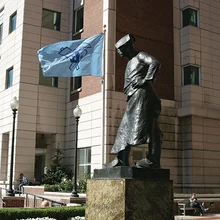
Quant Guide 2017: Columbia School of Engineering
Fu Foundation School of Engineering and Applied Science, New York City, USA

MS in Financial Engineering | metrics table at end of article
The master’s in financial engineering offered by the Fu Foundation School of Engineering and Applied Science – part of New York’s Columbia University – will celebrate its twentieth anniversary in 2018. But the programme is keeping track with rapidly evolving industry expectations for quant graduates: alongside the grounding it offers in core financial markets topics, it has recently added courses on data science and analytics, for instance.
“In recent years, big data is definitely in the forefront in terms of student demand, so we’ve added courses in data analytics, big data in finance, and also more advanced doctoral-level courses,” says Jenny Mak, executive director of the programme. “Another area that we’re strengthening is our foundational core, making sure our students have a good foundation in the basics of accounting, finance, economics, because a lot of our students are very quantitative when they come in and they may or may not have taken an accounting course.”
Typically, the programme runs for one year, starting in August. However students who wish to do an optional summer internship can take advantage of the degree’s flexible structure and graduate in December.
The programme consists of core modules, electives and five concentrations. Students may choose from a selection of optional modules, offered by various schools within the university, including the business school, law school, arts and sciences school, international and public affairs school, in addition to the modules within the engineering school.
There are five tracks students can choose from, appealing to those who want to develop a narrow specialisation. “Otherwise they’re free to choose from a long list of electives and not concentrate on anything. Concentrations are there for students who really wish to focus on a particular area,” explains Mak.

The programme offers concentrations in finance and economics, derivatives, asset management, computation and programming, and computational finance & trading systems. Students are required to choose a minimum of three modules offered under any given concentration, and have free choice of electives from the wider pool.
Every student must complete a course in optimisation models and methods, stochastic models, foundations of financial engineering, professional development, Monte Carlo simulation, and continuous time models as well as a module on statistical analysis and time series analysis.
Students will also learn the rudiments of C, C++ and Python; the latter was added to the curriculum three years ago.
The staff faculty bolstered its ranks in 2016 by hiring Xunyu Zhou, an expert in behavioural finance. Before joining Columbia, he was the Nomura professor of mathematical finance at the University of Oxford, leading the mathematical and computational finance group and directing the Oxford-Nie Financial Big Data Lab. He currently teaches the course in continuous time models.
Garud Iyengar, chair of the department who has been with the programme since its inception, teaches a core module in optimisation and an elective in machine learning.
Enrolees are required to attend financial engineering practitioners seminars. Every year Emanuel Derman, the programme director, lines up a number of speakers that come to the programme to talk about their industries and research. Previous speakers include Peter Carr, former Risk magazine Quant of the Year, who currently chairs the finance and risk engineering department at NYU Tandon School of Engineering; James Strugger, head of derivatives products and derivatives strategist at MKM Partners, and Allan Malz, an adjunct associate professor at Columbia, who most recently worked at AIG.

Students are required to run an academic journal, in which they share their perspectives on information presented to them through the seminars. “It’s a reflective exercise to practise their ability to synthesise information that was presented to them. It also allows students to practise their writing, which is an important component that we want to instil,” says Mak.
The department also facilitates student involvement in competitions, including the Rotman International Trading Competition at the University of Toronto, providing sponsorship.
Alumni networks play an important role in the functioning of the master’s. Programme administrators hold regular meetings with former students, many of whom reside in New York. According to Mak, they support the programme by providing advice on its curriculum, as well as hiring students.
“Most of our students are employed by alumni or word of mouth. Placing our students every year hasn’t been a problem as a result of that,” she says.
The alumni network isn’t the only source of support. The programme has a whole career team at its disposal, specifically tasked with placing students. A compulsory professional development course is an integral part of the master’s: attendance is only waived in exceptional circumstances, for example, if students already have a number of years in the industry under their belt.
The programme also receives guidance from an advisory board of senior industry practitioners, including hedge fund managers and investment bankers.

Click here for links to the other universities and an explanation of how to read the metrics tables
Only users who have a paid subscription or are part of a corporate subscription are able to print or copy content.
To access these options, along with all other subscription benefits, please contact info@risk.net or view our subscription options here: http://subscriptions.risk.net/subscribe
You are currently unable to print this content. Please contact info@risk.net to find out more.
You are currently unable to copy this content. Please contact info@risk.net to find out more.
Copyright Infopro Digital Limited. All rights reserved.
As outlined in our terms and conditions, https://www.infopro-digital.com/terms-and-conditions/subscriptions/ (point 2.4), printing is limited to a single copy.
If you would like to purchase additional rights please email info@risk.net
Copyright Infopro Digital Limited. All rights reserved.
You may share this content using our article tools. As outlined in our terms and conditions, https://www.infopro-digital.com/terms-and-conditions/subscriptions/ (clause 2.4), an Authorised User may only make one copy of the materials for their own personal use. You must also comply with the restrictions in clause 2.5.
If you would like to purchase additional rights please email info@risk.net
More on Quantitative finance
Quant Finance Master’s Guide 2026
Risk.net’s guide to the world’s leading quant master’s programmes, with the top 25 schools ranked
Baruch, Princeton cement duopoly in 2026 Quant Master’s Guide
Columbia jumps to third place, ETH-UZH tops European rivals
Quant Finance Master’s Guide 2025
Risk.net’s guide to the world’s leading quant master’s programmes, with the top 25 schools ranked
Baruch maintains top spot in 2025 Quant Master’s Guide
Sorbonne reclaims top spot among European schools, even as US salaries decouple
Quant Finance Master’s Guide 2023
Risk.net’s guide to the world’s leading quant master’s programmes, with the top 25 schools ranked
Baruch topples Princeton in Risk.net’s quant master’s rankings
US schools cement top five dominance as graduate salaries soar
Is it worth doing a quant master’s degree?
UBS’s Gordon Lee – veteran quant and grad student supervisor – asks the hard question
Starting salaries jump for top quant grads
Quant Guide 2022: Goldman’s move to pay postgrads more is pushing up incomes, says programme director







